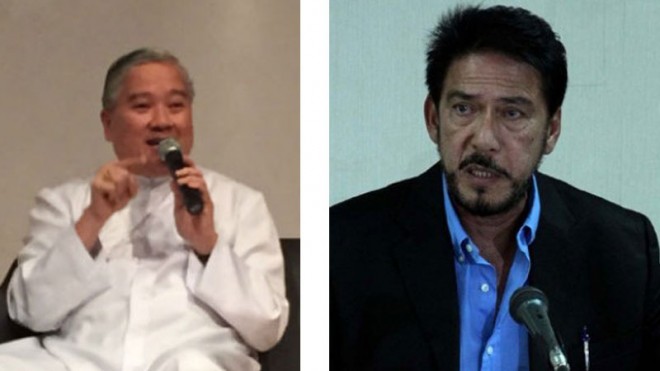The Catholic Bishops’ Conference of the Philippines (CBCP) has raised concern over the reported involvement of government officials in the worsening drug problem besetting the country, Sen. Vicente Sotto III told the Inquirer on Sunday.
The proliferation of the drug trade is one of the issues that the CBCP is expected to deal with in its pastoral statement to be released Sunday at the conclusion of its three-day plenary, according to Sotto, who was among those invited as a resource person by the prelates, outside of their closed-door meeting that began on Saturday.
“They wanted to be briefed and enlightened about the drug situation in the country and how the Church can help,” said Sotto, the Senate minority leader and former chair of the committee on illegal drugs.
During his two-hour briefing on Sunday, he said the bishops asked him about the government success rate in stopping the drug trade at the barangay level. The prelates also asked him if there were government officials in drug trafficking.
“I told them there is an existing watch list that the Philippine Drug Enforcement Agency (PDEA) maintains,” Sotto said but added that he was not authorized to disclose details.
Other issues that the bishops discussed were the presidential balloting next year, the plans of the Commission on Elections (Comelec) on the automation vote and the various modes the Comelec was considering and the K-12 program of the Department of Education.
Comelec Chair Andres Bautista and Education Secretary Armin Luistro were among those invited by the prelates.
Archbishop Socrates Villegas of Dagupan and Lingayen was reelected CBCP president by 82 of the 95 bishops on Saturday at the start of the plenary assembly at Pope Pius XI Catholic Center in Manila.
Archbishop Romulo Valles of Davao was likewise reelected vice president of the prelates’ conference.
Both senior prelates will serve until Nov. 30, 2017.
Villegas, 54, a protégé of the late Jaime Cardinal Sin, has been one of the vocal critics of the Aquino administration, particularly on the issue of “selective justice.”
He has said that “a government that professes to tread the straight path must remain true to that profession and must be willing to let go of the corrupt in its own ranks.”
He has also spoken out against Malacañang’s Disbursement Acceleration Program, parts of which have been declared unconstitutional by the Supreme Court.
“When I see my weak self and my lack of experience, I am overcome with fear. I would have wanted to rest and take it more leisurely,” Villegas said in a statement yesterday. “When I gaze on the face of God rich in mercy I take courage and regain my hope and courage.”
He said he accepted the reelection, knowing “many are praying for me. God is merciful.”
Prosecution rate
In his presentation on Sunday, Sotto told the bishops that less than 20 percent of drug violators in the country had been prosecuted.
He said that based on the 2014 report of the PDEA, “shabu” (methamphetamine hydrochloride) and marijuana remained the “most abused illegal drugs” in the country as shown by the number of arrests involving these drugs.
He said the PDEA had reported an increasing number of incidents of transporting drugs via mail and parcel services “since detection is much lower due to anonymity and use of fictitious names to mislead authorities.”
“Furthermore, utilization of various materials like sandals, milk boxes and electronic devices to conceal illegal drugs was also noted,” Sotto said in his speech, a copy of which he gave the Inquirer.
Out of 42,065 barangays in the country, 20.25 percent are deemed to be drug-affected since “there is a determined existence of a drug user, pusher, manufacturer, marijuana cultivator or other drug personality regardless of number in the area.” The National Capital Region is the most drug-affected followed by Calabarzon.
“The fight against drugs will never be won if we do not concentrate on prevention and rehabilitation. Even if we collect and destroy all the illegal and dangerous drugs in the country today, as long as there are drug dependents, there will be drug abuse,” Sotto said.
Permanent council
The CBCP also announced on Friday the election of members of the conference’s permanent council, headed by the CBCP president and vice president, which convenes twice a year and is composed of prelates representing Luzon, the Visayas and Mindanao.
According to the CBCP, the permanent council ensures that decisions made in the plenary assembly are executed, prepares the agenda for the meetings of the plenary assembly, as well as examines and drafts the annual budget for submission and approval of the assembly.
Likewise, the council prepares the pastoral letters of the Philippine Church hierarchy on issues decided in the plenary assembly.
Among members of the permanent council are Bishops Rodolfo Beltran of San Fernando, La Union province; Ruperto Santos of Balanga, Bataan province; Gilbert Garcera of Daet, Camarines Norte province; Bernardino Cortez of Infanta, Quezon province; and Reynaldo Evangelista of Imus, Cavite province, all representing Luzon.
Representing the Visayas are Bishops Crispin Varquez of Borongan, Eastern Samar province; and Narciso Abellana of Romblon province. While elected to represent Mindanao in the permanent council are Bishops Jose Cabantan of Malaybalay, Bukidnon province; and Angelito Lampon of Jolo, Sulu province.
Also reelected CBCP officers are Palo, Leyte province, archbishop John Du as treasurer and Fr. Marvin Mejia as secretary general.
RELATED STORIES
CBCP exec: Many persons with HIV/AIDS come from broken families
CBCP: There is no need for divorce in PH
